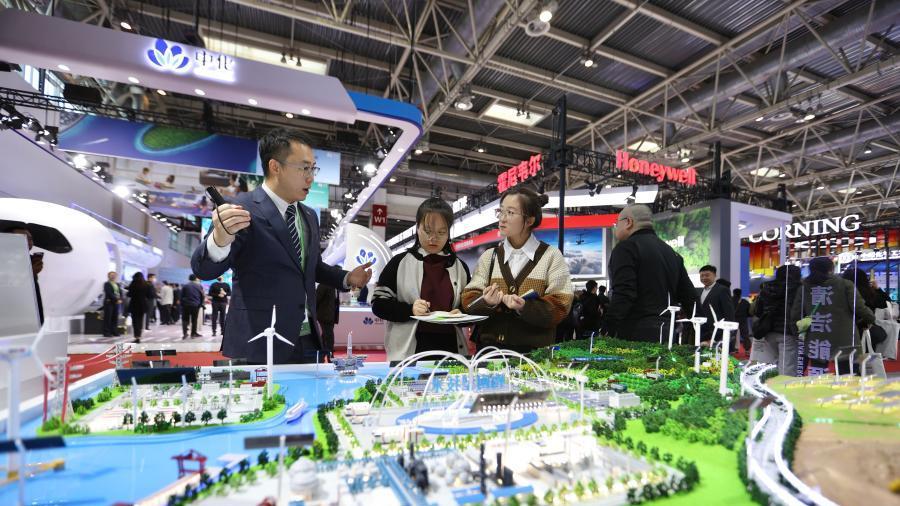China and Namibia open up new fronts under BRI

Elia George Kaiyamo, Namibian Ambassador to China (Li Hao/GT)
Namibia and China are highly aligned in green transformation and there is a great potential for both sides to explore future cooperation in this field, Elia George Kaiyamo, the Namibian ambassador to China, told the Global Times in an exclusive interview.
Namibia, a country in southern Africa, is heavily dependent on electricity imports, with about 50 percent of its electricity currently sourced from neighboring countries, a challenge the ambassador emphasized must be addressed.
"We aim to continue strengthening our cooperation, attracting more Chinese businesses, and fostering partnerships in key industries as such," he said, giving examples of new energy vehicles (NEVs) in which Chinese companies have competitive advantages, particularly in cost-effectiveness.
"In fact, many people in Namibia already drive Chinese cars... but we're now looking into bringing Chinese NEVs to Namibia," the ambassador said, noting that this could involve establishing plants and supply chains locally.
In addition to the NEVs, Namibia plans to become a regional hub for hydrogen production in southern Africa, according to media reports, as part of the country's efforts to facilitate green transformation and energy supply.
"We hope Chinese companies will support us in advancing hydrogen production... We aim to improve our energy sector and achieve energy independence, and collaborating with Chinese companies will be critical in achieving this goal," Kaiyamo said.
Kaiyamo is not the only official of the African country who extended the invitation to Chinese companies for collaboration. In a recent interview with Kornelia Shilunga, deputy minister of Mines and Energy of Namibia, she also told the Global Times that Namibia welcomes Chinese companies to take part in the development of renewable energy of the country as it seeks economic development and green transition.
"We have also had good partnerships in the relevant field and some mining and energy projects that have been done by Chinese companies," Shilunga said.
Namibia is also looking into the potential to collaborate with Chinese companies on building a nuclear power plant, Shilunga said, noting that this remains in the early stages of discussion, with initial meetings already underway.
The southern African country has already had landmark projects with the cooperation of Chinese companies in the green field.
Noticeably, in September, Namibia's state-owned power utility NamPower signed a contract with two Chinese firms to start building the country's largest solar power plant, according to media reports.
The southern African country is a net importer of electricity, relying on neighboring Zambia and South Africa for power, but the plant will add 100 megawatts to its current total installed power capacity of roughly 500 MW, according to the Reuters report.
The plant will help stabilize future electricity tariff increases, support Namibia's economic growth, and promote environmental sustainability, the report said, citing a statement made by Kahenge Haulofu, NamPower managing director.
In extending appreciation for all the support from the Chinese side, Shilunga told the Global Times "We want our economy to grow, but we cannot do it alone. We need and we welcome cooperation from countries like China."
A reliable partner
The cooperation in green fields highlights the strength of bilateral ties. Since the establishment of diplomatic relations in 1990, relations between the two countries have developed smoothly with frequent high-level exchanges.
In March 2018, the two countries established the China-Namibia comprehensive strategic partnership of cooperation, and the two countries signed a Memorandum of Understanding on Belt and Road Initiative (BRI) Cooperation, ushering in a new era of bilateral cooperation.
"Namibia sees a bright future in its cooperation with China under the BRI... Participating in the joint initiative has brought significant benefits to Namibia, such as improved infrastructure, including roads and bridges," Kaiyamo said.
For instance, a road project between the airport and the country's capital is nearing completion. Constructed by a Chinese company, this project will significantly reduce travel time between the airport and the capital from the current 1-2 hours to less than just 45 minutes, the ambassador said.
This road project is just one example, with more Chinese investments expected to flow into Namibia in the near future.
In an open speech in October, the Chinese ambassador to Namibia Zhao Weiping said that "In the next 5 to 10 years, we may expect a big expansion of Chinese investment in Namibia." Chinese companies will invest in extensive areas such as oil and gas, green hydrogen, agriculture, education, infrastructure, and information technology, Zhao said.
As cooperation under the BRI framework gains momentum, it has faced criticism from certain Western media, which assert that China is using the initiative to expand its influence over participating nations including Namibia.
In response to the allegations, Kaiyamo said that China focuses on mutual trust and long-term partnerships, proving itself a reliable and invaluable partner. Namibia will not be swayed by some propaganda by Western media, the ambassador said.
"China understands our financial struggles and works with us patiently," Kaiyamo said. He gives the example of when Namibia faced challenges completing certain projects, China extended timelines and provided flexible terms, "unlike other nations that might have pressured us to repay immediately."
This cooperative and brotherly relationship shows China's genuine commitment to Africa's development, Kaiyamo said.
Photos
Related Stories
- Senior Chinese legislator visits Trinidad and Tobago
- Xi calls for alignment of Belt and Road Initiative with Bolivia's 2025 development plan
- Belt and Road cooperation between China, Peru benefits the world
- China's BRI injects vitality into millennia-old Silk Road: Cambodian senior minister
- Belt and Road meeting in Peru eyes new opportunities
Copyright © 2024 People's Daily Online. All Rights Reserved.









